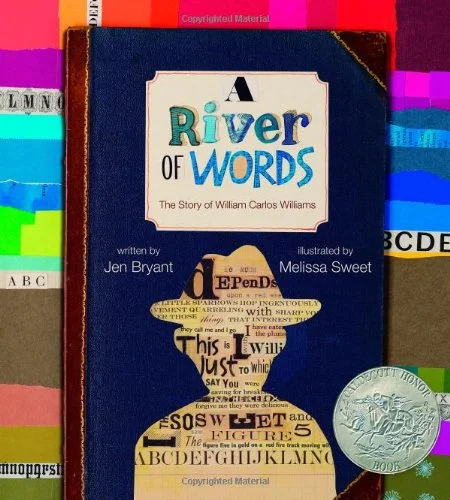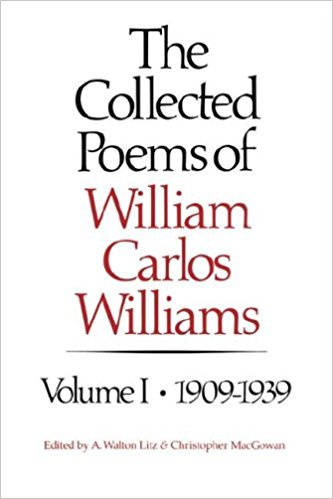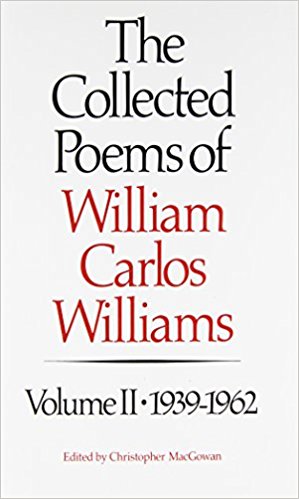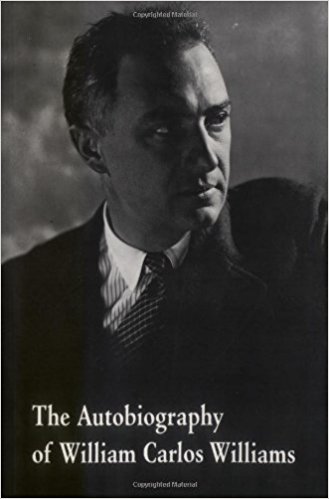A River of Words
"What becomes of me has never seemed to me important, but the fates of ideas living against the grain in a nondescript world have always held me breathless." —William Carlos Williams, Autobiography
"I am a writer/ and I take / great satisfaction / in it"
"One doesn't paint an abstract painting," William Carlos Williams writes in his autobiography, "One makes a painting." And so we might extend his words on painting to poetry. Through the illustrations of A River of Words, we are transported through the making of Williams' life and poetry.
Two-time Caldecott Award winner Melissa Sweet portrays the life and poetry of William Carlos Williams through collages of found text, book covers, and handwritten words. The literary materials mix with soft watercolor backgrounds to represent the world of words that ran parallel to Williams "ordinary" life as doctor and father. Tucked away in the small town of Rutherford, New Jersey, Williams was content to pursue his love of writing:
There is great virtue in such an isolation. It permits a fair interval for thought. That is, what I call thinking, which is mainly scribbling. It has always been during the act of scribbling that I have gotten most of my satisfactions.
"I like to time / my phrases "
Author Jen Bryant begins the story of Williams as any life does: in childhood. Young "Willie" could roam through fields and forests and found solace there. In his autobiography, Williams remembers just how powerful his observations of the world were to him:
It is a pleasure for me now to think of these things, but especially of the flowers I got to know in those precincts...The slender neck of the anemone particularly haunts me for some reason and the various sorts of violets—the tall blue ones, those with furry stems and the large, scarce, branching yellow ones, stars of Bethlehem, spring beauties, wild geranium, hepaticas with three-lobed leaves. My curiosity in these things was unbounded—secret, certainly.
Williams' delight in the quotidian—something particular in his poetry—is evident throughout the illustrations and excerpts of poems woven into the pictures.
"balance them by / their sensual / qualities and make"
Williams discovered poetry at school. He could be critical of his own poetry, but nonetheless relished in the joy it brought him. As an adult, he recalls the first poem he ever wrote. "My first poem was born like a bolt out of the blue," he writes in his autobiography. He shares the poem:
A black, black cloud
flew over the sun
driven by fierce flying
rain.
Sweet's illustrations mark Williams' work as a writer through these early years and into adulthood.
"those express / as much as / or more"
William Carlos Williams published over forty books of poetry, essays, and prose in addition to being an avid letter-writer with friends. All of his writing took place during whatever pockets of time he could snatch between seeing patients (for he was the town doctor). He explains in his autobiography:
Five minutes, ten minutes, can always be found. I had my typewriter in my office desk. All I needed to do was to pull up the leaf to which it was fastened and I was ready to go. I worked at top speed. If a patient came in at the door while I was in the middle of a sentence, bang would go the machine—I was a physician. When the patient left, up would come the machine. My head developed a technique: something growing inside me demanded reaping. It had to be attend to.
After a long day's work, he would write to clear his mind of any thoughts. "Cleansed of that torment, having scribbled," he writes, "I could rest."
"burden of the thing"
Although Williams lived all his life in the town of his childhood, he was not isolated from the literary world. As a college student, he became friends with Ezra Pound and Hilda Doolittle (H.D., as she was known). He travelled abroad on his own and with his wife and met figures such as W.B. Yeats, Ernest Hemingway, James Joyce, and Gertrude Stein. His personal interests and his work put him in contact with creatives in other fields, such as photographers Alfred Stieglitz and Man Ray, and choreographer Martha Graham. These creative connections helped sustain Williams' writing.
In The Autobiography of William Carlos Williams, he begins the story of his life with "nine-tenths of our lives is well forgotten in the living." There is much remembered, however, and his is a story worth recounting.
"than the merely / literal"
Jen Bryant and Melissa Sweet's book paints a picture of what could have seemed like an ordinary life but is instead layered with the endless possibility of words and images. With these pages, we see the work of writing. His own dedication to his work recalls to mind an idea captured beautifully by the writer Annie Dillard: "How we spend our days is how we spend our lives." Day by day, poem by poem, Williams made the life he wanted.
"could ever tell"
A River of Words received a Caldecott Honor Award in 2009 and is published by Eerdmans Books for Young Readers. Both the author and illustrator include notes to the reader. Illustrator Melissa Sweet, in particular, includes details about her research and preparation for her pictures. She writes:
There were a lot of false starts—nothing I did seemed powerful enough to match his poems....The book covers became my canvas, and any ephemera I had been saving for one day became fodder for the collages.
*The headings for each section in this article quote the entirety of Williams' poem "From a Play." The poem can be found in Collected Poems: 1939-1962, Volume 2.
**Illustrations © Melissa Sweet courtesy of Eerdmans Books for Young Readers; photographs by Iliana Gutierrez
*Frontispiece
Bryant, J. Illus. by M. Sweet. (2008). A River of Words. Grand Rapids, MI: Eerdmans Books for Young Readers.














